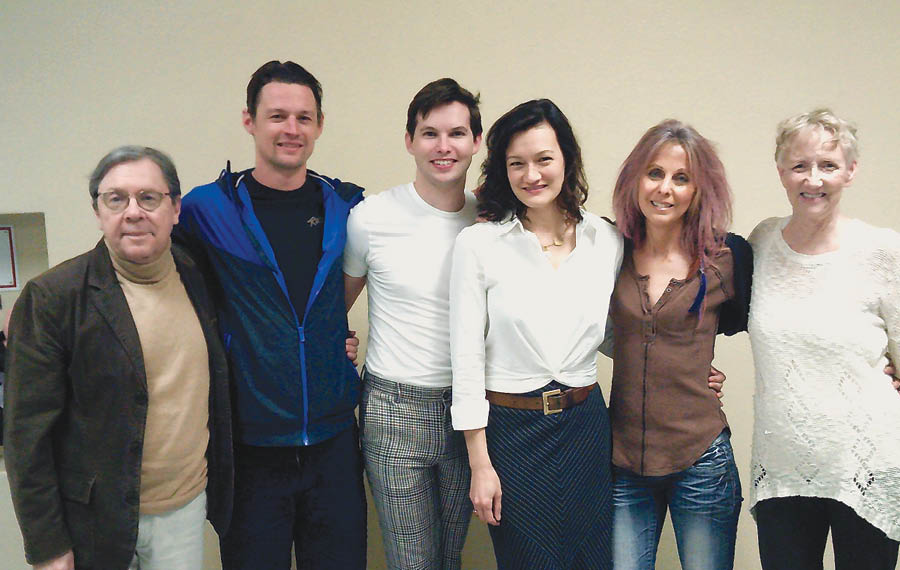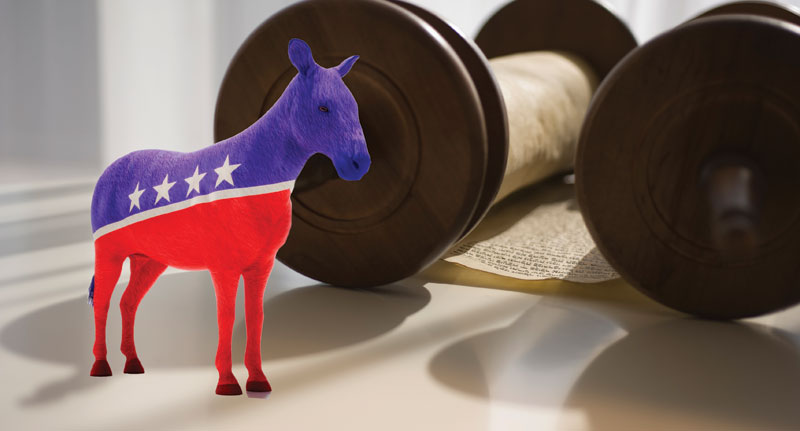
Although he’s largely forgotten today, actor William Haines was one of Hollywood’s top leading men of the silent and early talkie eras, acting in 50 films for MGM between 1922 and 1934. His career came to an abrupt end because he was gay and refused to give in to studio chief Louis B. Mayer’s demands to hide his homosexuality and marry a woman.
Their battle of wills plays out in the world premiere production of “Taming the Lion,” at Theatre 40 in Beverly Hills, which also follows Haines’ relationships with his boyfriend Jimmie Shields and his friend Joan Crawford, his co-star in “Spring Fever,” “West Point” and other films. (Other real-life characters include producer Irving Thalberg and Mayer’s loyal secretary.) It’s an entertaining glimpse into a bygone era, and it remains relevant nearly nine decades later.
“Even today, in this country and around the world, people are afraid to speak up because they could lose their jobs or even be deported,” director Melanie MacQueen told the Journal at a rehearsal. “The main message of it is be true to yourself but being true to yourself can sometimes cost you everything — your career or even your life.”
Landon Beatty, who plays Haines, admires the star’s “willingness to be so unapologetic about himself and his life. He wasn’t willing to compromise, and that wasn’t common at the time,” he said. His preparation for the role included watching Haines’ films, reading biographies and practicing to play a smoker. “Haines smoked like a chimney,” Beatty noted.
“I feel responsibility because I want to do him justice,” he added. “I like playing real people because it always gives you an extra in, allows you to feel more connected. I grew up gay in Alabama so there’s a lot I can relate to. ‘Don’t be like that.’ ‘Don’t act this way.’ ‘It’s not OK. It’s not right.’ There’s a lot of that in every LGBT kid’s life.”
Even today, in this country and around the world, people are afraid to speak up because they could lose their jobs or even be deported. The main message of [the play] is be true to yourself but being true to yourself can sometimes cost you everything.” — Melanie MacQueen
Similarly, Niko Boles identified with Jimmie Shields, but it wasn’t related to sexuality. In the past, Boles felt pressured to hide the fact that he was Jewish. “I experienced anti-Semitism in college. My name isn’t Schwartz, so people couldn’t tell I [was] Jewish. There were snide comments,” he said. “It’s kind of insidious. The one form of discrimination common to every hate group is anti-Semitism. It’s everywhere.”
Boles spent his early years in a Jewish neighborhood in the San Fernando Valley, attending bar and bat mitzvahs and later going to Israel on Birthright. But he delayed having his own bar mitzvah until he was 30. “I waited till I felt like I was an adult,” he said. He became an accountant because as the son of an actor, “I grew up in what you would call creative poverty. I wanted a stable job. But I wasn’t happy doing it. I’m happier now tending bar and acting.”
Playing his first gay character was a bit of a learning curve “to work through and understand,” he said, but a scene in which Haines and Shields dance was far more challenging. “I have two left feet,” Boles said. He hopes that audiences connect with the play’s messages about tolerance and authenticity. “I’d like people to take away that having the courage to stand up for what you believe in will reap rewards. And that forcing people to hide things creates a lot of pain. It’s important to accept people as they are.”
For Jeffrey Winner, the challenge was playing two sides of Louis B. Mayer: the brash mogul who ruled Hollywood and the insecure man who worried about being hated. The play touches on the subject of Jewish assimilation, via Mayer’s (né Lazar Meir) efforts to hide his heritage, and Haines slamming him for it. “At the time, you couldn’t be honest about your sexuality or about being Jewish,” Winner said.
As writer Jack Rushen’s research confirmed, “Mayer denied his background. He changed his name, he celebrated Christmas,” the Connecticut-based playwright said in a subsequent telephone interview.
Rushen hadn’t heard of Haines before he stumbled upon the 2001 documentary “Out of the Closet, Off the Screen” on YouTube. “It lit a fire. I often write about fairness, treating people fairly, and this fit right in,” he said. “Haines wants to be an actor and live an open life and Mayer is keeping him from that so there’s a lot of conflict. Actors were controlled by the studio and a morals clause, so you couldn’t live the way you wanted to. Even today celebrities are constantly on guard. One false move and there goes the career.”
Currently working on a new play about a bipolar artist who thinks he’s the reincarnation of Vincent Van Gogh and a TV comedy script about a group of older actors who haven’t given up their dreams of making it, Rushen hopes his current production will promote conversation. “I always think that people should leave the theater a little more empathetic and compassionate and walk away talking about the play,” he said. “If the play doesn’t get people thinking and discussing, I haven’t done my job.”
“Taming the Lion” runs Mar. 12-Apr. 12 at Theatre 40 in Beverly Hills. Visit the website for tickets.






















 More news and opinions than at a Shabbat dinner, right in your inbox.
More news and opinions than at a Shabbat dinner, right in your inbox.